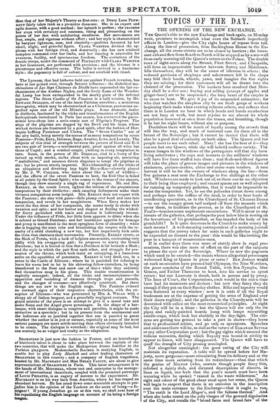The Lyceum, that had hitherto held out against French invasion,
has been at last gained over, through Satanic influence : the diabolical ma- chinations of Les Sept Chateau:c du Diable have superseded the fair en- chantments of the Arabian Nights, and .the lively flame of the Wonder- ful Lamp has been extinguished in the murky glare of the infernal regions. The Seven Castles of the Passions is a bald version, by Mr. EDWARD STIRLING, of one of the latest Parisian novelties ; a monstrous incongruity, which may be characterized as a Christmas pantomime en- grafted upon one of the old Miracle plays. Some dramatic dealer in diablerie, fascinated by the tricks and transformations of the English barlequinade introduced in Paris last season, has converted the panto- mimic love-chase into a serio-comic sort of Pilgrim's Progress. The steps of the pilgrims are dogged by the Devil and his imps, whose wicked devices are frustrated by a good spirit, after the fashion of Har- lequin baffling Pantaloon and Clown. The "Seven Castles" are of the airy build, being merely the scenes of as many temptations by seven Passions—Pride, Envy, Idleness, Rage, Avarice, Love, and Luxury. The subjects of this trial of strength between the powers of Good and Evil are two pair of lovers,—a sentimental pair, proof against all wiles but those of Cupid.; and a comical couple, yielding to every temptation in turn. Satan, in the person of Mr. DIDDEAR, clad in a livery of fire turned up with smoke, stalks about with an imposing air, muttering "malediction," and assumes divers disguises to tempt the pilgrims to sin: but he proves utterly impotent. Notwithstanding all the tricks of an ubiquitous and diverting imp bight Ric-a-Rae—cleverly played by Mr. J. W. COLLIER, who darts about like a ball of wildfire— and the efforts- of the seven Passions to boot, the Evil One is foiled at all points by-the Good-Spirit; who comes to the rescue of the sinners, though they show scarcely a single rag of repentance. Mr. and Mrs. KEELEY, as the comic lovers, lighten the tedium of the preposterous temptations by their drolleries : such amusing delinquents make their virtuous companions seem insipid. Mrs. KEELEY does not coquet with the Passions ; she sins with gusto—falls plump over head and ears into temptation, and revels in her naughtiness. When Envy makes her covet the fine dress of- her companion, she seems ready to choke with -vexation and spite ; and her horror and disgust at finding the wished. for- finery garnished with toads and snakes is ludicrously intense. Under the-influence of Pride, her little form appears to dilate when she is saluted as-Grand Dutchess; and her inordinate appetite for homage and pomp is manifested-in the most egregious form of absurdity : while she is hugging the state robe and brandishing the sceptre with the te- nacity of a child clutching a new toy, her feet impatiently hick aside the trainthat.obstructstheir movements. Presently, KEELEY enters, as the Shah of Persia, with a. look of helpless amazement, contrasting very oddly with his swaggering gait : he proposes to marry the Grand Dutchess ; but it is hinted-to him theta Dutchess is far beneath a Shah ; and the style in which the pair flout each other, and struggle for pos- session of the throne, which both insist on occupying, is a humorous satire on the squabbles of potentates. KEELEY is very droll, too, in a scene in the Castle of Idleness ; where he is punished for refusing to leave his warm bed to let in his shivering fellow-travellers, by being transferred to the frost and snow out of doors while they suddenly find. themselves snug in his place. This double transformation is capitally managed: indeed, all the tricks and metamorphoses—the apparition and vanishing of dtemons through traps and pannels, and the changes of costume—are effectively contrived. But these things are not new- to the English stage. The Passions evinced no outward signs of their respective characteristics, with the ex- ception of Idleness—who was personated by Mrs. A. WIGAN with a sleepy air of listless languor, and a gracefully negligent costume. The grand mistake of the piece is an attempt to give it a moral tone and make Satan and the Angel grave personages. In the shape of a bur- lesque, with smart dialogue in couplets and parodies, it might be made attractive as a spectacle; but in its present form the sentimental and the ludicrous are so jumbled together that one is puzzled to guess 'whether the author is in jest or earnest, especially as some of the most serious passages are more mirth-moving than others obviously intended to be comic. The dialogue is wretched: the original may be bad, but can scarcely, be.so vulgar and trashy as the adaptation.


























 Previous page
Previous page